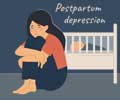New research has found that a drug called brexanolone used for treating post-partum depression works by inhibiting systemic inflammatory pathways.

Uncovering the Role of Brexanolone and Inflammation in Post-Partum Depression
A research team at the UNC School of Medicine has found that brexanolone works within the body by inhibiting the key systemic inflammatory pathways that are associated with depression. The new finding is monumental in that it suggests that PPD is likely caused, at least in part, by inflammation.‘Brexanolone inhibited the toll-like receptors responsible for the production of the markers of inflammation in post-partum depression.’





They found that brexanolone inhibited the toll-like receptors responsible for the production of cytokines and chemokines - the markers of inflammation. Toll-like receptors are like gatekeepers on the surface of cells, recognizing molecules and then initiating a cell’s inflammatory response.These results provide the first human data showing that blockade of specific inflammatory pathways is likely involved, at least in women who were unresponsive to other medications. Their results were published in eBioMedicine.
According to recent studies, one in eight women experience post-partum depression symptoms, and the prevalence of depression diagnoses at delivery is rising. The CDC reports that rates in 2015 were seven times higher than they were in 2000. However, scientists are still unsure of what causes PPD to develop in the brain.
One potential cause of PPD could be a deficiency in GABAergic transmission, which calms the brain via a neurotransmitter known as GABA. GABA, or y-Aminobutyric acid, is found in our central nervous systems and instructs our bodies to stop, or inhibit, the activity of neurons. Additionally, PPD could also be caused by deficits in our normal responses to stress.
But recent data and this new study suggest that inflammation may be contributing to the syndrome. Much like other types of depression, PPD is typically treated with SSRIs, but sometimes patients don't improve with conventional therapy.
Advertisement
By the same reasoning, brexanolone or other anti-inflammatory drugs may also be effective for treating other types of depression that elevate inflammatory markers. The team hopes that their new findings may lead to more cost-effective treatments that can block the same inflammatory pathways that were identified in the study.
Source-Eurekalert















